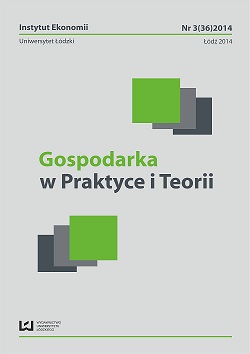The Rationality of Energy Management in the Transport Sector in EU
DOI:
https://doi.org/10.18778/1429-3730.36.05Słowa kluczowe:
zrównoważony transport, konsumpcja energii, emisje CO2Abstrakt
The main objective of this article was to make a quantitative and qualitative attempt to examine the relationship and the correlations between the development of transport and fuel efficiency of resource use. The analysis has shown that road transport has now gained a special status in people’s daily lives. The increased mobility of European citizens has caused cars to currently have the greatest share of the energy needs of road transport. This happened in despite improvements in the energy efficiency of these cars and freight transport growth. The projected continued growth of freight transport will contribute to the further changes in the structure of energy consumption by road transport. Despite the high growth rate of energy efficiency and improvement in trucks, the share of demand for fuel by these vehicles will increase the total fuel demand for the road transport sector. At the same time the energy consumption of cars will reduce their share in the total fuel needs of transport. The improvements of energy efficiency of passenger cars and trucks will not offset the increase in demand for energy in road transport. The above regularities create a key challenge facing the transport system – how to meet the constantly growing demand for energy? An important issue in achieving the objectives of sustainable transport is not only the development of technology, but also human awareness shaping proper consumer preferences. The future of transport will depend on both the carriers and the customers.
Bibliografia
A Roadmap for moving to a competitive low carbon economy in 2050, COM (2011) 112, Brussels 2011.
Google Scholar
Accompanying the White Paper – Roadmap to a Single European Transport Area – Towards a competitive and resource efficient transport system, SEC (2011) 391 final, Brussels 2011.
Google Scholar
Clean Power for Transport: A European alternative fuels strategy, COM (2013) 17 final, Brussels 2013.
Google Scholar
Energy Efficiency Plan 2011, COM (2011) 109, Brussels 2011.
Google Scholar
Energy Efficiency Trends in the transport sector in the EU. (2012). Lessons from the ODYSSEE MURE.
Google Scholar
Expertise. Improving energy efficiency of transport in Poland – analysis of available resources and proposals for action, made for the Ministry of Transport, Construction and Maritime Transport Policy and the Department of International Cooperation, ECORYS Poland, Warsaw 2012.
Google Scholar
Lapillonne B., Pollier K. (2014), Energy Efficiency Trends in Transport in the EU, Enerdata.
Google Scholar
Motowidlak U., Trends in the Transport Sector as a Manifestation of Paradox Jevons’a, SDS 2014 – Sustainable Development Symposium, 4th Annual European Postgraduate Symposium – Pan European University of Bratislava, Bratislava 2014.
Google Scholar
Proposal for a Directive of the European Parliament and of the Council on the deployment of alternative fuels infrastructure, COM (2013) 18, Brussels 2013.
Google Scholar
White Paper. Roadmap to a Single European Transport Area – Towards a competitive and resource efficient transport system, COM (2011) 144, Brussels.
Google Scholar
http://ec.europa.eu/health/data_collection/policy/index_pl.htm.
Google Scholar
http://www.odyssee-indicators.org/online-indicators/.
Google Scholar








